What is RV-K ?
RV-K cable is widely known for its high-performance, durability, and safety features. RV-K cable is a type of single-core or multi-core flexible cable used for low voltage electrical installations. It is made up of stranded copper conductors with PVC insulation and an outer sheath made of PVC. The “K” in RV-K stands for Kontrolliert (controlled), indicating that this cable has been tested and approved according to German standards.
The stranded copper conductors in RV-K cables are designed for flexibility and durability. Single strands are twisted together to form a conductor that can be bent and bent without breaking. This makes the cable ideal for applications that require flexibility, such as robotics or automated systems.
PVC insulation on conductors provides electrical insulation and protection from electrical interference. It also helps prevent current leakage between conductors. The insulated design withstands a range of environmental elements such as heat, cold and moisture, making it suitable for use in harsh environments.
The outer jacket of it is also made of PVC to provide extra protection for the conductors. The sheath is designed to resist abrasion, chemicals and oils, making it ideal for industrial and commercial applications. Sheaths also help reduce the risk of electric shock and other hazards.
RV-K cables are available in single and multi-conductor configurations. Single-core cables consist of a single conductor, while multi-core cables consist of multiple conductors that are insulated and sheathed together. This makes it suitable for a wide range of applications including power distribution, motor control and lighting systems.
The “K” in RV-K cable means it has been tested and approved according to German standards. This means the cable meets strict quality and safety standards, ensuring it is a reliable and safe choice for electrical installations.
Advantages of it
- High Flexibility – The cable is highly flexible and can bend easily without breaking or damaging the cable.
- Durability – The cable is resistant to wear and tear, making it ideal for use in harsh environments.
- Safety – The cable is designed to meet strict safety standards, providing reliable performance and protection against electrical hazards.
- Cost-effective – The cable is an affordable option compared to other types of cables with similar specifications.
- Easy Installation – The cable is easy to install and requires minimal maintenance.
Applications
The special cable is commonly used in a variety of low voltage electrical installations. Some common applications include:
- Power distribution in buildings and industrial plants.
- Wiring for lighting and control systems.
- Connection of electrical equipment, machinery, and appliances.
- Installation of renewable energy systems such as solar panels and wind turbines.
How it Differs from Other Types of Cables
The cable is generally more flexible than other types of cables, making it easier to install in tight spaces or around obstacles.
- The cable has a higher resistance to abrasion and wear, making it more durable in harsh environments.
- The cable is designed to meet strict safety standards, providing reliable performance and protection against electrical hazards.
- The cable is often more cost-effective than other types of cables with similar specifications, making it a great option for those on a budget.
- The cable is suitable for use in both indoor and outdoor installations, depending on the specific requirements of the application.
Different Types of Cable
- Single-Core Cable – This type of cable has one conductor and is typically used for power distribution in buildings and industrial plants.
- Multi-Core Cable – This type of cable has multiple conductors and is commonly used for wiring lighting and control systems, as well as connecting electrical equipment, machinery, and appliances.
- Armored Cable – This type of cable has an additional layer of protection, usually made of steel or aluminum, to provide extra protection against abrasion and damage.
- Solar Cable – This type of cable is specifically designed for use in solar panel installations and can withstand exposure to sunlight and extreme temperatures.
Sizes and Specifications
- RV-K cable comes in various sizes and specifications to meet different application requirements. The most common sizes are 1.5mm², 2.5mm², 4mm², 6mm², 10mm², 16mm², 25mm², and 35mm².
- It’s important to choose the right size and specification of the type of cable for your specific application to ensure reliable performance and safety.
Installation Tips
- Make sure to cut the cable to the correct length before installation to avoid any excess slack that could cause tripping hazards or damage to the cable.
- Use appropriate tools such as wire strippers and crimping tools to ensure a proper connection between the cable and any connectors or terminals.
- Follow all safety guidelines and regulations when installing RV-K cable to protect yourself and others from electrical hazards.
- Avoid bending the cable below its minimum bending radius to prevent damage to the cable insulation.
- Inspect the cable regularly for any signs of wear, tear, or damage, and replace it if necessary to ensure continued safe and reliable operation.
In conclusion
RV-K cable is an excellent option for low voltage electrical installations. Its high flexibility, durability, and safety features make it a reliable choice for a variety of applications. Whether you’re installing lighting and control systems or connecting electrical equipment, machinery, and appliances, it is sure to provide the reliable performance and protection you need. If you’re looking for a cost-effective and easy-to-install solution for your next low voltage installation, consider the cable.
Anyte Cable not only develops and manufactures standard high-quality cables, but also provides excellent solutions according to your needs and product applications. Welcome your inquiry at any time.
Related Products

STA Armoured cable




